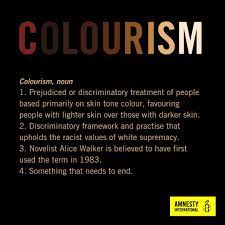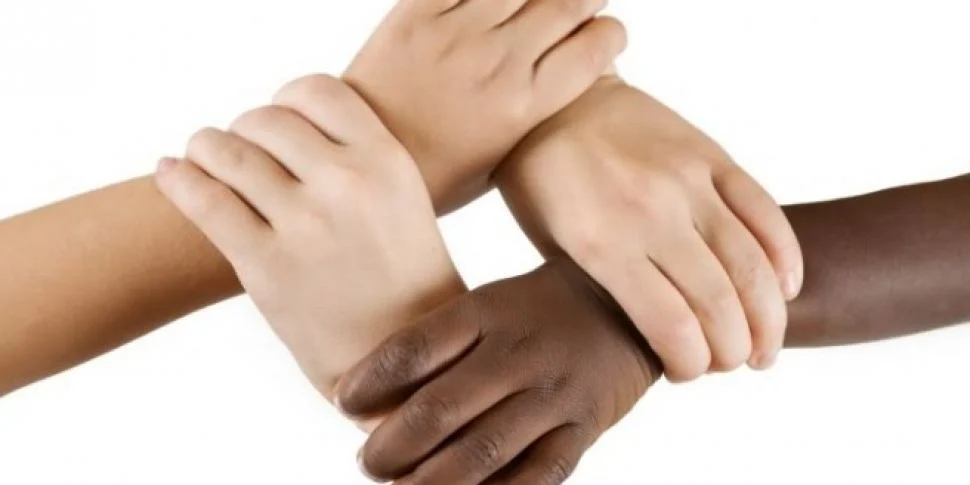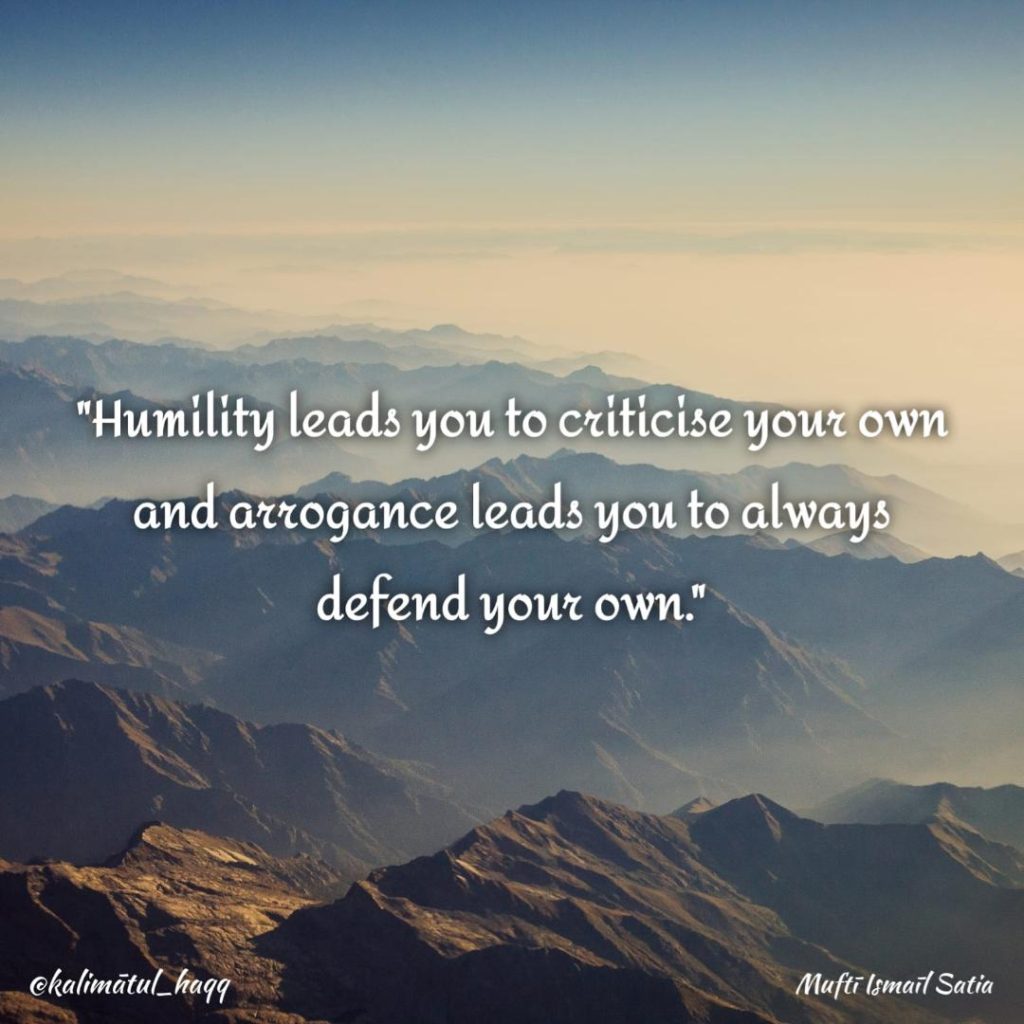Categories
PDF Books
- Post author By Ismail ibn Nazir Satia
- Post date 5 March 2023
- 1 Comment on PDF Books
- Sticky post
How many times have you heard within your family, something along the lines of ‘he’s really good looking and fair’ or ‘she’s so fair’ with their eyes lit up? How many times have you heard something like ‘it’s all good but he’s quite dark’ with a tinge of sympathy or ‘I hate getting tanned!’ In a tone that’s a little bit uncomfortable? This is colourism. Colourism is a form of heavy discrimination within the same race, it’s internal, it’s a ‘within your own people’ problem… and boy, don’t we all know about it. I still struggle to believe that in 2022, it is STILL an issue, still, a thing that’s got to be spoken about and still an innate disease stirring in and amongst us.

When the British ruled India, discrimination based on skin colour was most visible. The white British foreigners were symbols of power, authority and wealth and thus, light skin served as a signal of high status across the country. Those individuals with a lighter skin colour enjoyed more privileges from the British, were considered to have a more affluent status and gained preference in education and employment and darker-skinned individuals were socially and economically disadvantaged, and this disease continued…
This dangerous phenomenon of colourism passed on, to the extent that huge, ‘forward-thinking’ corporate brands such as L’Oreal have had no qualms in putting up gigantic billboards across the busy roads of India advertising their skin-lightening products with famous celebrities such as Priyanka Chopra (who, ironically, likes to push herself as a humanitarian) being the face of such companies. So, is it really any wonder that the power of colourism has crept into our South Asian psyche so silently and so dangerously, that today in 21st century Britain, we are still so wrapped up about the colour shade of our own people.
In a Hadeeth, it is narrated: ‘We passed by Abu Dharr (Allah be pleased with him) in Rabadha. Abu Dharr (Allah be pleased with him) said, “I had a quarrel with one of my brethren whose mother was of foreign descent, so I vilified him as ‘you son of a black mother’. He went to complain about me to the Prophet ﷺ. When the Prophet ﷺ met me (one day), he said, ‘Abu Dharr, you are someone who still displays Jahiliyyah (ignorance).’ Now, this Hadeeth might be focused on racism rather than colourism but the concept is the same. Discriminating and belittling because of the colour of the skin was deemed as ‘someone who still displays ignorance’ by our Prophet ﷺ. Our beloved Prophet ﷺ was a forward-thinking man, he was progressive in his ideologies and so for him, this was incredibly backwards. He remarked to Abu Dharr (Allah be pleased with him) that he ‘still’ displayed signs of ignorance so imagine if our Prophet ﷺ was to see that 1400 years later, we, the South Asian community, STILL have deeply entrenched traits of colourism within us. We still have marks of ignorance. We still haven’t progressed. We still think fair skin = excellence and dark skin = inferiority.
If we zoom in, we can observe that colourism has played a dark and ugly role in the field of matrimony. I use past tense, but a huge part of me says that should be corrected to the present tense and that colourism still rears its ugly head in marriages. It beggars disbelief when a mother refuses to accept a girl for her son because she’s ‘a bit on the dark side’. When asked for a potential spouse, ‘fair’ is a requirement. Yes, ‘fair’. They are flagrantly and unashamedly stating that a person with darker skin shade is not good enough for their family.
Colourism is heavily embedded throughout South Asian culture. The lack of melanin in your skin isn’t just used as a marking point of attractiveness, but the colour of your skin is frequently used to determine your self-worth. And this toxic rhetoric spills out of the household, out of our communities, and feeds into racism beyond our culture. If we don’t like dark-skinned Asians, we definitely don’t like the Black community – it’s an uncomfortable truth, isn’t it?

I’d like to think the tide is slowly turning. The international brand Unilever recently announced it would no longer use the word ‘fair’ in the name of its popular (in South Asian countries) skin-lightening cream Fair & Lovely. Johnson & Johnson has discontinued two skin care products that promote “fairness”. While, most recently, L’Oreal has stopped using the words “fair”, “fairness”, “light” and “lightening” on its products. So we have some progress. But that’s just the tip of the iceberg. Colourism is so deeply embedded in our communities from the top down and unfortunately, we still have a lot of work to do. We actively need to hold conversations around it to stamp it out properly. It’s a mindset that needs to be changed and reformulated. We have to be more alert to the micro aggressions that have become a part of our daily dialect, especially amongst the older generations (‘she’s so dark’ ‘you need to scrub your tan off’, ‘I wish I was fairer’…) and be brave enough to challenge them.
Ismail ibn Nazir Satia (one who is in dire need of Allah’s forgiveness, mercy and pleasure)
1 Dhul Hijjah 1443
If you are a Barelwi and you always stick up for Barewlis, understand this isn’t Islam.
If you are a Deobandi and you always stick up for Deobandis, understand this isn’t Islam.
If you are a Salafi and always stick up for Salafis, understand this isn’t Islam.
This is called following your ego, and we have many “ego bhais” in ALL societies.
The same applies to Indians and Pakistanis who stick up for their own… follow Islam and don’t get so so defensive!

If Ulama showed a bit of humility then I wouldn’t need to take to such platforms, we always believe in telling people privately, unfortunately, they don’t always listen. Shame on some Pakistanis and Pakistani Ulama who showed a lack of sympathy towards the poor girl who committed suicide, Ayesha Banu, from India (Allah have mercy upon her).
We all know suicide is Haram. The video of Mufti Tariq Masood saheb where he says, “don’t have mercy upon her” further he make jokes about suicide was TOTALLY insensitive. We all know Mufti Tariq Saheb is very humorous, but so is Mufti Ismail Menk. But the video of Mufti Ismail Menk was far more sensitive and considerate and heartfelt. Defensive Pakistanis said that Mufti Tariq Saheb is humourous, I am sorry Mufti Ismail Menk is far more humorous? He didn’t laugh, nor make jokes, he didn’t even smile. He said we need to look at Ayesha’s background and what led to her suicide. Mufti Tariq didn’t do this, he didn’t even know if the story was true? (A quick google search would have helped mufti saheb). As Ulama, before we do a lecture on ANY topic we are told to do research and motala. Something as sensitive as suicide needed background information on the girl and her story. If you don’t have time, don’t do a bayan.
I have followed Mufti Tariq Masood for years, he is a good speaker. But the reason I’ve had to point this out is due to Pakistanis and Pakistani ulama who are pure and plain defensive. They can’t accept a word against their ‘pukstani ulama’. That’s not following Islam, that is following your ego. I actually don’t follow Mufti Ismail Menk, but we give credit where it’s due, Alhumdu Lillah!
The second category of people I want to call out are the narrowminded Deobandis. They have totally dismissed Mufti Menk’s video, you know why? “He’s not one of us….” Astagh firullah! Disgusting…
“Accept the truth even, if it is from a child.” Fudhayl ibn Ayadh RH.
I am also Deobandi, but we cannot be so narrowminded. Our true akabir and pious predecessors did not ignore the truth when it reached them, they were humble and accepted, even if they were wrong (naturally, they also made mistakes).
A girl lost her life due to domestic violence and long-suffering. And all Pakistani ulama can do is massage their ego? “We are right…” I just hope it’s not because she was “Indian.” Pakistanis pipe up very quickly against Gujaratis and Gujarati racism… we accept that there is racism in Gujaratis. But dear Pakistanis, you also need to accept this maxim, “if you want to criticise others, learn to accept criticism.”
Ismail ibn Nazir Satia (one who is in dire need of Allah’s forgiveness, mercy and pleasure).
29 Rajab 1442

On Saturday, 19 January 2019, 10:43:43 GMT, imraan <admin@daruliftaa.net> wrote:
Question:
Salams Mawlana,
I would like to ask, as we live in England and Christmas is creeping up slowly, many Muslims decide to have a feast on Christmas day with the family. They specifically cook Turkey, imitating the non-Muslims.
They say it is the only day the family can get together (as Xmas day is a bank holiday). But I usually tell them Boxing Day is also a Bank HOliday, cook it on the 26th December?
Is cooking a Turkey on Xmas day permissible, in light of the Hadith, “Whoever imitates a nation is from them.”
Ismail, Blackburn
Answer:
In the Name of Allah, the Most Gracious, the Most Merciful.
As-salāmu ‘alaykum wa-rahmatullāhi wa-barakātuh.
Cooking turkey and eating it on Christmas Day is a custom of the Christians.[1]
King Henry VIII was the first English king to eat turkey on Christmas Day. The tradition of eating turkey at Christmas spread throughout England in the 17th century. It also became common to serve goose which remained the predominant roast until the Victorian era. [2]
In the 1900s, turkey became a popular Christmas dish where it became more accessible and affordable.[3]
The Fuqaha (jurists) have ruled that it is impermissible to offer gifts or perform another action that is conducted by the non-Muslims on their sacred days.[4] Consider the following warnings issued by the Fuqaha on such conduct:
Imam Qadhi Khan (rahimahullah) mentions:
وعن الإمام أبي جعفر الكبير رحمه الله تعالى: اذا عبد الرجل خمسين سنة، ثم جاء يوم النيروز وأهدى الى بعض المشركين بيضة يريد به تعظيم يوم النيروز فقد كفر بالله وحبط عمله[5]
“It is narrated from Imam Abu Ja’far Al Kabir (rahimahullah Ta’āla) that if a man worshipped Allah for fifty years, then on the day of Nayruz, he gifted an egg in respect of Nayruz, then he has disbelieved in Allah and all his (good) deeds have been lost.”
Nayruz (also known as Nowruz) is the Zoroastrian New Year’s day. It is celebrated by the Zoroastrians (followers of Zoroastrianism).[6]
It appears that there is nothing wrong in gifting an egg. However, such an act will be analysed in the context of the sacred day of the Zoroastrians. They exchange gifts on that day in reverence of that day. When a Muslim offers another a gift, it resembles the action of the Zoroastrians respecting that day, hence, it is impermissible.
Imam Burhan ad Deen al Bukhari (rahimahullah) has mentioned:
المسلم اذا أهدى يوم النيروز الى مسلم آخر شيئا ولم يرد به تعظيم اليوم ولكن جرى على ما اعتاده بعض الناس لا يكفر، ولكن ينبغي ان لا يفعل ذلك في ذلك اليوم خاصة، ويفعله قبله أو بعده كيلا يكون شبيها بأولئك القوم وقد قال النبي عليه الصلاة والسلام: (من تشبه بقوم فهو منهم)[7]
“If a Muslim gives a gift to another Muslim and he does not intend glorifying that day but it is the habit of some people, he will not have committed kufr. However, he should not do that on that specific day. He should do it before it or after it so as to not imitate those people for verily Nabi (sallallahu alayhi wasallam) has said, “Whosoever imitates a group of people is amongst them.”
Shaikh Zadah Efindi (rahimahullah) mentions:
ويكفر بوضع قلنسوة المجوس على رأسه على الصحيح إلا لتخليص الأسير أو لضرورة دفع الحر والبرد عند البعض وقيل إن قصد به التشبيه يكفر[8]
“According the most correct opinion, that person has committed kufr if he wears the headwear of a Magian except, according to some, to free a prisoner of war or for a need (such as) to keep away the cold and heat. It has been said that if he intended imitation by it, then he has committed kufr.”
Rasulullah (sallallahu alayhi wasallam) is reported to have said:
مَن تَشَبَّه بقومٍ فَهُوَ مِنْهُم[9]
“Whosoever imitates a group of people is amongst them.” (Abu Dawood: 4031)
Therefore, Muslims should not cook turkey on Christmas day and eat it.
And Allah Ta’āla Knows Best
Mizanur Rahman
Student, Darul Iftaa
UK
Checked and Approved by,
Mufti Ebrahim Desai.
[1] British Turkey. 2018. Christmas Day Meal Stats. [ONLINE] Available at: http://www.britishturkey.co.uk/facts-and-figures/christmas-day-meal-stats.html.
The Fact Site. Why Do We Eat Turkey on Christmas Day?. [ONLINE] Available at: https://www.thefactsite.com/2012/12/why-do-we-eat-turkey-on-christmas-day.html.
[2] Wikipedia. 2018. Christmas dinner. [ONLINE] Available at: https://en.wikipedia.org/wiki/Christmas_dinner.
[3] British Turkey. 2018. Christmas Day Meal Stats. [ONLINE] Available at: http://www.britishturkey.co.uk/facts-and-figures/christmas-day-meal-stats.html.
[4] البحر الرائق شرح كنز الدقائق ومنحة الخالق وتكملة الطوري، زين الدين بن إبراهيم المعروف بابن نجيم المصري (المتوفى: 970هـ)، دار الكتاب الإسلامي، القاهرة، مصر (5/ 133)
وبخروجه إلى نيروز المجوس والموافقة معهم فيما يفعلون في ذلك اليوم وبشرائه يوم النيروز شيئا لم يكن يشتريه قبل ذلك تعظيما للنيروز لا للأكل والشرب وبإهدائه ذلك اليوم للمشركين ولو بيضة تعظيما لذلك اليوم
حاشية رد المحتار على الدر المختار: شرح تنوير الأبصار، محمد أمين الشهير بابن عابدين (المتوفى: 1252هـ)، ايچ أيم سعيد كمبني، كراتشي، باكستان (6/ 755-754)
(والإعطاء باسم النيروز والمهرجان لا يجوز) أي الهدايا باسم هذين اليومين حرام (وإن قصد تعظيمه) كما يعظمه المشركون (يكفر) قال أبو حفص الكبير: لو أن رجلا عبد الله خمسين سنة ثم أهدى لمشرك يوم النيروز بيضة يريد تعظيم اليوم فقد كفر وحبط عمله اهـ ولو أهدى لمسلم ولم يرد تعظيم اليوم بل جرى على عادة الناس لا يكفر وينبغي أن يفعله قبله أو بعده نفيا للشبهة ولو شرى فيه ما لم يشتره قبل إن أراد تعظيمه كفر وإن أراد الأكل كالشرب والتنعيم لا يكفر زيلعي.
[5] فتاوى قاضيخان، فخر الدين ابو المحاسن حسن بن منصور المعروف بقاضيخان الأوزجندي (المتوفى: 592هـ)، دار الكتب العلمية (3/519)
وعن الإمام أبي جعفر الكبير رحمه الله تعالى: اذا عبد الرجل خمسين سنة، ثم جاء يوم النيروز وأهدى الى بعض المشركين بيضة يريد به تعظيم يوم اليروز فقد كفر بالله وحبط عمله
[6] Heritage Institute. Nowruz. [ONLINE] Available at: https://www.heritageinstitute.com/zoroastrianism/nowruz/index.htm.
Encyclopædia Britannica. 2013. Nōrūz. [ONLINE] Available at: https://www.britannica.com/topic/Noruz.
[7] المحيط البرهاني، برهان الدين محمود بت صدر الشريعة ابن مازة البخاري (المتوفى:616هـ )، ادارة القرآن والعلوم اسلامية، كراشي باكستان – المجلس العلمي، جوهانسبرغ، جنوبي أفريقية
9287- قال في الجامع الأصغر: رجل اشترى يوم النيروز شيئا لم يكن يشتريه قبل ذلك، ان أراد به تعظيم النيروز كما يظمه المشركون يكفر، وان أراد به الأكل والشرب والنعمة لم يكفر. 9288- قال صاحب الجامع الأصغر المسلم اذا أهدى يوم النيروز الى مسلم آخر شيئا ولم يرد به تعظيم اليوم ولكن جرى على ما اعتاده بعض الناس لا يكفر، ولكن ينبغي ان لا يفعل ذلك في ذلك اليوم خاصة، ويفعله قبله أو بعده كيلا يكون شبيها بأولئك القوم وقد قال النبي عليه الصلاة والسلام: (من تشبه بقوم فهو منهم).
[8] مجمع الأنهر في شرح ملتقى الأبحر ومعه الدر المنتقى في شرح الملتقى، الشيخ زاده المعروف بداماد أفندي (متوفى:1077هـ)، دار الكتب العلمية، بيروت، لبنان (2/ 513)
ويكفر بوضع قلنسوة المجوس على رأسه على الصحيح إلا لتخليص الأسير أو لضرورة دفع الحر والبرد عند البعض وقيل إن قصد به التشبيه يكفر
[9] سنن أبي داود ت الأرنؤوط، أبو داود سليمان بن الأشعث الأزدي السِّجِسْتاني (المتوفى: 275هـ)، دار الرسالة العالمية، بيروت، لبنان (6/ 144)
حدثنا عثمان بن أبي شيبة، حدثنا أبو النضر، حدثنا عبد الرحمن ابن ثابت، حدثنا حسان بن عطيه، عن أبي منيب الجرشي عن ابن عمر، قال: قال رسول الله – صلى الله عليه وسلم -:، من تشبه بقوم فهو منهم”
مرقاة المفاتيح شرح مشكاة المصابيح، علي بن (سلطان) محمد أبو الحسن نور الدين الملا الهروي القاري (المتوفى: 1014هـ)، دار الفكر، بيروت، لبنان – الطبعة الأولى: 2002م (7/ 2782)
(وعنه) : أي عن ابن عمر (قال: قال رسول الله – صلى الله عليه وسلم – (من تشبه بقوم) : أي من شبه نفسه بالكفار مثلا في اللباس وغيره، أو بالفساق أو الفجار أو بأهل التصوف
To proceed,
The tradition in Muslim religious literature of gathering collections of forty Hadiths dates as far back as the first century after the Hijrah. Abdullah ibn Mubarak al-Marwazi (Allah have mercy on him) is thought to be the first to have gathered forty Hadith in a collection. Perhaps the most well-known collection is that of Imam an-Nawawi (Allah have mercy on him), which has been translated into English, and on which there are several commentaries.
The practice of gathering forty Hadiths springs from a Hadith, narrated through several Companions, which puts the spiritual rank of religious scholarship within easy reach of the ordinary believer: “Whoever memorises forty narrations for my nation in matters of this religion, Allah will raise him up a scholar and I shall be an intercessor and witness for him on the Day of Rising.”
Allah make us from them.
Ismail
15 Shaban 1441

This was narrated by Qari Ismail Samni (Allah fill his grave with noor), Bolton: “Shaykh AbulHassan Nadwi (Allah have mercy upon him) visited the UK and a programme was held for Ulama. At the start of the talk, Shaykh mentioned a dream in which he saw the blessed and glorious vision of the Final Messenger, the Seal of the Prophets ﷺ. In the dream, the Prophet ﷺ mentioned that he had his eyes on the Muslims of England (mere nazar England walo par hein).
On hearing this, the Ulama present were delighted and overjoyed. After which Shaykh stated, ‘There is no need to be so happy! Let me explain… if a mother has two children, one is playing in the garden and the second is playing near the fire. Which child does the mother have her eye on? Obviously, the one near the fire. Similarly, the interpretation of the dream is the Prophet ﷺ has his eyes fixated on the people of England because your Imaan is at risk. You may ask how? The Muslims of Makkah and Madinah will not sell their Imaan, because they are surrounded by Muslims and they are living in a Muslim country. At the most, they will commit sins. Same for the people of Pakistan, they will not sell their Imaan. As for the Muslims for India, they live in a Hindu country but totally oppose the actions of the Hindus. They dress differently, worship differently and keep Masjids and Hindu Temples separate.
What I have seen in the UK, especially in the young generation, step by step and inch by inch they follow the non-Muslims in every way; in their dress; in their food; their hairstyles; and their whole lifestyle. You are surrounded by non-Muslims, it is very easy to sell your Imaan living in the West.'”
Mawlana then continued his bayan.
It is December, the time of the year we see festive decorations and lights all around the country. Christmas is coming soon… Living in a non-Muslim country, how should we participate in this Christian festival? Are we allowed to attend Christmas parties? Should we let our children partake in Santa’s Grotto? When they attend school they want to play a part in the nativity play, is this Halal? Further, on Christmas day should we exchange gifts with our families and our Christian neighbours? Can we prepare a turkey dinner on Christmas day and enjoy it with the family? I won’t answer all these questions, but it is food for thought, further to the dream I mentioned in the start.
See full fatwa
I will, however, like to touch on an issue increasing in the UK, having a turkey dinner on Christmas day. It is forbidden for a Muslim to prepare a turkey dinner on Christmas because this is an imitation of non-Muslims. It is confirmed in an authentic narration that “whoever imitates a people is one of them.”
Saying that the family gathers on this day and this is not with the purpose of imitating the non-Muslims but due to the fact that this day is a (bank) holiday, then this does not make it permissible for you to do this, because, in essence, you are imitating them. Gathering on this day could be on any other kind of food, why then have specifically a turkey dinner? Is this not imitating them even in the kind of food they eat?
The prohibition of resembling the non-Muslims is not restricted to inward actions [beliefs, actions of the heart] and intentions, but also to outward actions. It is for this reason that the Prophet ﷺ prohibited us from performing the prayer at sunset and sunrise, and he ﷺ said that it rises between two horns of the devil and the polytheist prostate to it at this time, despite the fact that a Muslim prays to Allah and not to the horns of the devil. However, the Prophet ﷺ forbade us from performing the prayer at that time regardless of our intention.
The Prophet ﷺ also used to differ from the people of the book even in the way they combed their hair.
Indeed, there are many narrations of the Prophet ﷺ about differing from the people of the Book in regard to both words and actions.
Therefore, we advise you to fear Allah and not imitate the polytheists and act in conformity with them in their festivals and traditions which are peculiar to them.
One should explain to the family, that it is permissible for the family to gather on that day because it is a holiday but without making this day as a festival and imitating the non-Muslims in their eating traditions and the like. It should be a family gathering like all other gatherings throughout the year [without any special food, settings or decorations].
Ismail Ibn Nazir Satia (One who is in dire need of Allah’s forgiveness, mercy and pleasure)
29 Rabiul Awwal 1440

In Memory of My Late Father, NazirAhmed Daud Satia (1947 – 2013)
Here in Blackburn was where his life started,
He wasn’t just a man, he wasn’t just a father, but so ever kind-hearted;
Principled, firm, full of awe and his beauty shone through,
With a voice so strong, every word spoken true.
In India, is where his life began,
His move to England was Allah’s plan.
Justice was his strength, his aura so majestic,
Community work, joining ties, his charity and courage were fantastic.
His sincerity, selflessness, humility and much more,
Such men are rare, that’s for sure.
Memories of Abba, I will cherish forever,
I pray in Jannah we will be together.
His aura and character sticks in my mind,
His laughter and smile it was one of a kind!
You are now far from our sight
Your beauty disappeared like the day covered by night.
Thank you for a lifetime of lessons I will never forget,
It only seems like yesterday when your sun finally set.
The next stage of your life has been set to begin,
Allah elevate your status and resurrect you without a single sin,
We miss you deeply and wish you all the best,
Allah bless you with every stage of success.
I won’t be sad, I won’t shed a tear,
I know the angels await you, they proclaim: “Do not be sad and do not fear.”
I pray you rest forever in peace and harmony, I pray you will never have pain or ache,
Know for sure, we all love you deeply for Allah’s sake.
Your son, indebted to you forever (Five years on).
19 Rabiul Awwal 1440

